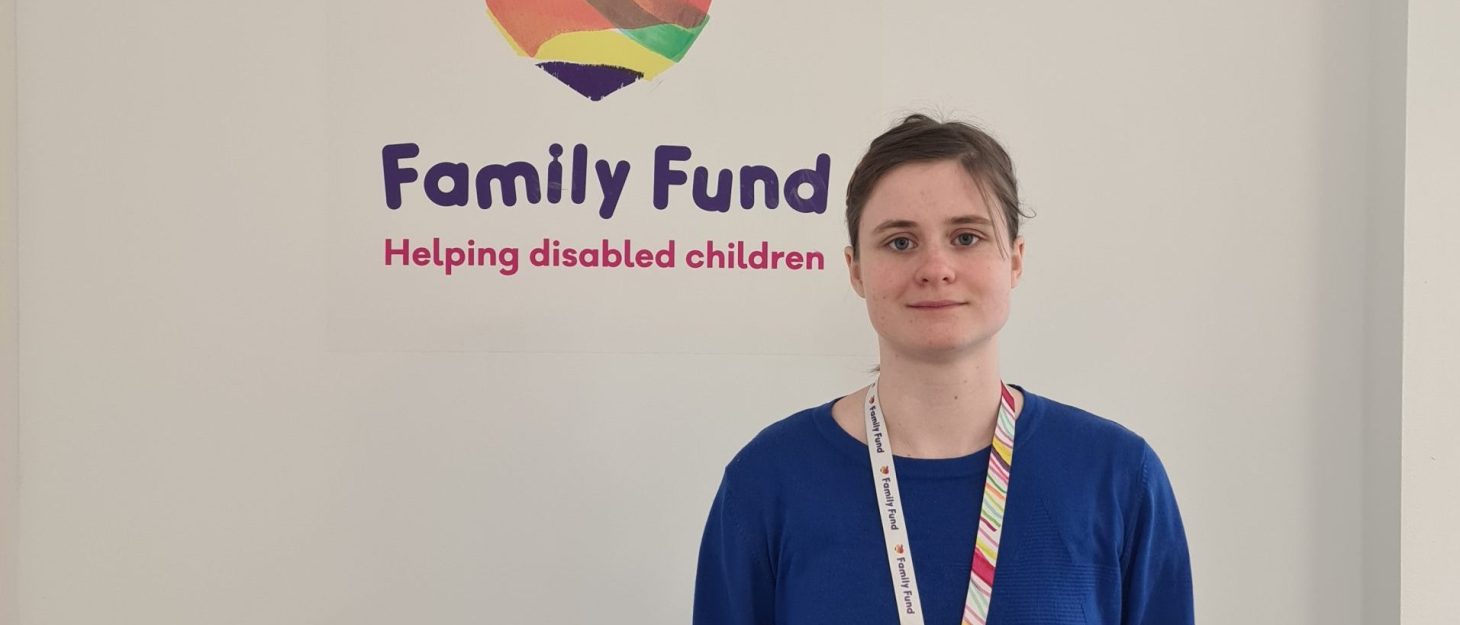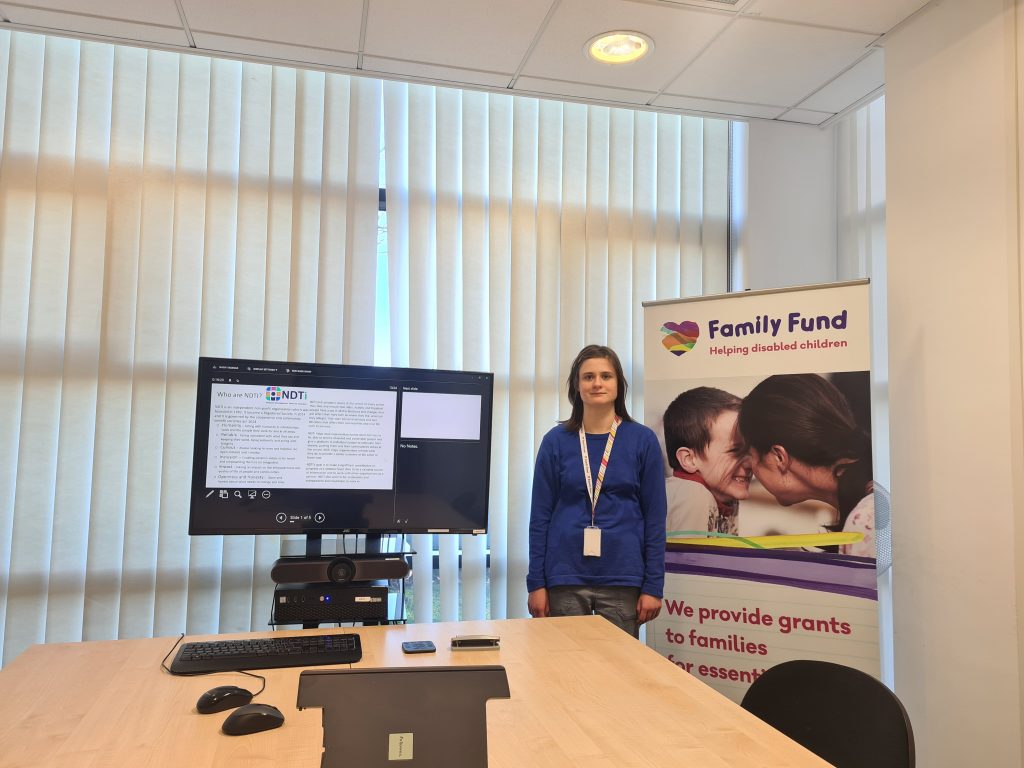
“I was ready for work experience and independence, but I wasn’t sure where to begin”
Alice is currently one of our supported interns. Supported by Blueberry Academy, she is following her ambitions and ”seeing a path to adulthood”.
The road to Family Fund
”I am a young Neurodivergent/Autistic person and I am sharing my experience of a Supported Internship.
I would like to start with where I have come from. In October 2021 I was an 18 year old girl who had left college because of severe burnout, mental health issues and the strain of the COVID-19 pandemic. I’m a naturally ambitious person and love thinking about the wider world and I happen to love philosophy. I had plans for my future, but I did not know where to begin.
I came to Blueberry Academy in York in January 2022 age 19. There I was taught values and life skills to prepare for adulthood and future employment. I did activities such as independence classes, gym and exercise, and being a trainee at the pop-up shop. These things helped me recover from what I went through, such as trauma from being isolated and overwhelmed through secondary school. A lot of the young people I met had very similar stories to me.
Hearing about the supported internship for the first time
In May, I decided I was ready for work experience. I was curious to see what I could do for the world to make an impact and take my first steps towards being an independent young woman. I told my support worker Claire that I was ready to find work experience, but I wasn’t sure where to begin. That’s when she told me about Family Fund.
Family Fund came to the Blueberry Academy a few weeks later. They gave us a very detailed PowerPoint presentation on the different roles we could apply for through the internship programme, and the support we would have. They told us about the managers and employees, our hours and what we would be working on. It made me start seeing a potential path to adulthood and also a pathway to empowering others as well as myself.
“I decided to apply to Service Delivery as it involved giving feedback as a young Autistic person, and researching topics related to disabled young people and people on low incomes. I felt I was one of the best people to do that as I have experience of institutions which have shaped me, and I felt I could service others as a young disabled person.”
I wrote my CV in a detailed way and represented myself the best I could. I know you should involve any previous work experience, any hobbies and extracurricular activities, good personal attributes you have and your personal values. With minimal support I managed to put together a pretty amazing summary of who I was and what I had achieved. I felt optimistic when I sent it off.
I found out that they asked me to put together a five slide PowerPoint so that they could get to know me as a person and was to present it to the Service Delivery Team as my interview. It included things such as my family members, hobbies, pets, and how to work with me best. I came into Family Fund and presented to my future team. Although I felt nervous they thought that I was excellent as I appeared confident. About a day later, I surely enough got a call and I found out that I did get the job. I was so elated and I saw my parents and family members excited and proud of me.
My experience so far
On my first day I was shown around the building. This was essential as to me it was scary and new. The team were very supportive, so me and the other interns could take in the new surroundings. This is important because it can take longer for autistic and neurodivergent people to get to know an environment because of our brains taking things in differently.
I had a support worker who was my job coach called Alex. He gives me feedback and advice if I found something hard or made a mistake. He sits at a desk close to me so I can ask him for help any time. I wasn’t confident about going to Family Fund on my own using the bus so Alex accompanied me until I knew the route. Pretty soon I could go to Family Fund myself using two buses to get there.
“Support workers are important because they give young people with disabilities support with learning a skill, and once the young person knows it they can use that skill independently.”
My role at Family Fund includes doing research and giving feedback on supporting disabled children and young people. I’ve done a lot since I first got this internship which increases my confidence. Personally I look forward to coming in and saying hello to my team in the morning and drinking a cup of tea at my computer!
I give presentations to the service delivery team on my research, which I find exhilarating as I like public speaking. I set myself time goals to do research on other organisations to try to learn time management. I’ve learned new facts about different groups within society and helped educate others, which has broadened my mind so much. My most recent project is related to researching organisations which promote digital equality. It includes ways organisations educate parents on how children and teenagers interact with the online world.

My hopes for the future and making internships more accessible
I believe that it is so crucial to make internships more accessible to young disabled people in Britain as there are many barriers we face, such as very high rates of bullying in schools, and learning being less accessible to us due to factors such as lack of training for staff and lack of accommodation such as ramps for example.
The fact that the buildings and culture of many schools and workplaces don’t take us into consideration put many young people under a constant strain. It leads to isolation and worse performance, and mental health issues.
“Speaking from my first-hand experience, making supported internships more available to young disabled people could be wholly effective in stopping this cycle as it accommodates our needs so that we can perform better and over time we need less support as we have learned new skills that can last a lifetime.”
Even though resources would be spent on making these internships available, in the long term more resources would come back in. It means these young people can now be independent, have skills and can help others. Also it reduces the stress on other services such as mental health services and the NHS, as young people will now be physically and emotionally healthier, less isolated and self-sufficient. It would also break cycles of intergenerational poverty as it could get people stable, well-paying jobs and improve quality of life. How fantastic is that!
Going forward, I hope to learn more about how to use my computer and technology. My hopes are to become more efficient, have better time management and help as many people as I can.
I hope to change the way disabled people are seen through my writing. I’d like to research more and find out more things about disabled young people on low income preferably from their own voices and educate people around me and be of influence. I hope to learn more about poverty and how there can be long term solutions to it involving autonomy and partnership from the people experiencing it themselves.
I’m looking forward to seeing what direction the future will bring and what I can do.”
